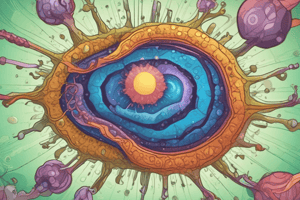Podcast
Questions and Answers
What does community ecology primarily focus on?
What does community ecology primarily focus on?
- Energy flow in ecosystems
- Interactions between different species in a community (correct)
- Population dynamics of a single species
- The genetic variation within a population
Which term describes large geographically distinct areas with similar climates and plant communities?
Which term describes large geographically distinct areas with similar climates and plant communities?
- Habitats
- Niches
- Biomes (correct)
- Ecosystems
What is the primary mechanism of evolution that leads to advantageous traits being passed on?
What is the primary mechanism of evolution that leads to advantageous traits being passed on?
- Mutation
- Genetic drift
- Natural selection (correct)
- Gene flow
In the classification system of living organisms, which rank comes after 'Phylum'?
In the classification system of living organisms, which rank comes after 'Phylum'?
Which branch of biology focuses on the study of microorganisms?
Which branch of biology focuses on the study of microorganisms?
Which characteristic of living organisms refers to the ability to maintain a stable internal environment?
Which characteristic of living organisms refers to the ability to maintain a stable internal environment?
What defines prokaryotic cells?
What defines prokaryotic cells?
What is the primary function of carbohydrates in living organisms?
What is the primary function of carbohydrates in living organisms?
Which area of biology focuses on the transmission of traits from parents to offspring?
Which area of biology focuses on the transmission of traits from parents to offspring?
Which statement correctly summarizes the cell theory?
Which statement correctly summarizes the cell theory?
Which type of biological molecule is essential for protein synthesis?
Which type of biological molecule is essential for protein synthesis?
What is the study of interactions between organisms and their environment called?
What is the study of interactions between organisms and their environment called?
Which process allows organisms to evolve and adapt to environmental changes over time?
Which process allows organisms to evolve and adapt to environmental changes over time?
Flashcards
Biology
Biology
The scientific study of living things, their structures, functions, origins, evolution, and distribution.
Cell
Cell
The basic unit of structure and function in living things.
Cell Theory
Cell Theory
The scientific idea that all living things are made of cells, cells are the basic units of life, and all cells come from existing cells.
Prokaryotic Cell
Prokaryotic Cell
Signup and view all the flashcards
Eukaryotic Cell
Eukaryotic Cell
Signup and view all the flashcards
Metabolism
Metabolism
Signup and view all the flashcards
Genetics
Genetics
Signup and view all the flashcards
Ecology
Ecology
Signup and view all the flashcards
Population Ecology
Population Ecology
Signup and view all the flashcards
Community Ecology
Community Ecology
Signup and view all the flashcards
Natural Selection
Natural Selection
Signup and view all the flashcards
Biodiversity
Biodiversity
Signup and view all the flashcards
Evolution
Evolution
Signup and view all the flashcards
Study Notes
Introduction to Biology
- Biology is the scientific study of life, encompassing various levels of biological organization, from molecules to ecosystems.
- It explores the structure, function, growth, origin, evolution, and distribution of living organisms.
- Key areas of study within biology include:
- Cell biology: The study of cells, their structure, function, and interactions.
- Genetics: The study of heredity and variation of traits.
- Ecology: The study of interactions between organisms and their environment.
- Evolution: The study of the evolution of life on Earth.
Characteristics of Living Organisms
- Living organisms exhibit several key characteristics:
- Organization: Living things exhibit highly organized structures at various levels, from molecules and cells to tissues, organs, and organ systems.
- Metabolism: Includes all chemical reactions within an organism needed to support life, such as the converting of food and energy.
- Responsiveness: Organisms respond to stimuli or changes in their surroundings.
- Growth and development: Living things increase in size and complexity throughout their life cycles.
- Reproduction: Organisms produce offspring, be it sexually or asexually.
- Adaptation: Organisms evolve and adapt to environmental changes over time.
- Homeostasis: Maintaining a stable internal environment despite external variations.
Cell Theory
- All living things are composed of cells.
- Cells are basic units of structure and function in living organisms.
- All cells arise from pre-existing cells.
Types of Cells
- Prokaryotic cells: Lack a nucleus and membrane-bound organelles. Examples are bacteria and archaea.
- Eukaryotic cells: Contain a nucleus and membrane-bound organelles. Examples are plant and animal cells.
Biological Molecules
- Four major classes essential to all life:
- Carbohydrates: Provide energy and structural support.
- Lipids: Store energy, form membranes, and regulate hormones.
- Proteins: Essential for various functions, including structural support, catalysis, and transport.
- Nucleic acids (DNA and RNA): Store and transmit genetic information.
Genetics
- Heredity: The transmission of traits from parents to offspring.
- Genes: The basic units of heredity, located on chromosomes.
- DNA: The molecule that carries genetic instructions.
- RNA: Plays a critical role in protein synthesis.
Ecology
- Study of the interactions between organisms and their environment.
- Focuses on:
- Population ecology: Studies populations of a single species.
- Community ecology: Studies interactions between different species in a community.
- Ecosystem ecology: Studies the flow of energy and matter within an ecosystem.
- Key concepts include:
- Biomes: Large geographically distinct areas with similar climates and plant communities.
- Biodiversity: The variety of life in a given area.
- Food webs and trophic levels
- Cycles such as carbon and nitrogen.
- Interactions within an environment (predation, competition, symbiotic relationships).
Evolution
- The process by which populations of organisms change over time.
- Mechanisms of evolution include:
- Natural selection: The process where organisms with advantageous traits are more likely to survive and reproduce.
- Genetic variation: The differences in genes between individuals within a population.
- Mutation: Changes in the DNA sequence that can introduce new traits.
- Genetic drift: Random changes in gene frequencies within a population.
Classification of Living Organisms
- Hierarchical system of grouping based on shared characteristics:
- Domain
- Kingdom
- Phylum
- Class
- Order
- Family
- Genus
- Species
Branches of Biology
- Microbiology: The study of microorganisms.
- Botany: The study of plants.
- Zoology: The study of animals.
- Anatomy: The study of the structure of organisms.
- Physiology: The study of the function of organisms.
Studying That Suits You
Use AI to generate personalized quizzes and flashcards to suit your learning preferences.




